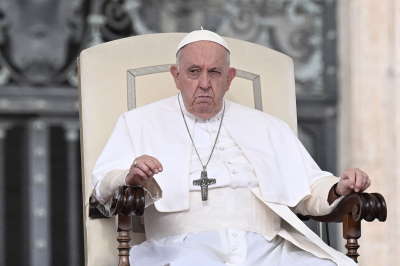What does Pope Francis want LGBTQ Catholics to do?

The Vatican declared in 2021 that same-sex relationships cannot be blessed because God “cannot bless sin.” And now less than three years later, Pope Francis has authorized blessings for same-sex couples. What exactly does Pope Francis want LGBTQ Catholics to do in response to his shocking declaration?
The Pope has a huge responsibility to clarify his hopes and dreams for LGBTQ Catholics, especially since “some Catholic bishops in Africa, Poland and elsewhere say they will not implement the new Vatican policy allowing blessings for same-sex couples.”
Does the Pope want these couples to view homosexual behavior as less sinful than fornication and adultery? Does he perhaps want them to celebrate their same-sex desires, or instead, turn away from those ungodly desires as other same-sex attracted individuals have done? Does the Pope pray that LGBTQ Catholics will repent of their homosexual behavior?
While Pope Francis has not specifically affirmed same-sex marriage, he has completely blurred the lines by declaring that priests can now “bless” same-sex relationships. Steven Millies explains that the Pope “is oriented toward caring for and ministering to people rather than teaching doctrine. The word ‘pastoral’ appears 20 times in the Pope's declaration.”
But how does this “pastoral” approach compare with the holy pastoral approach used by Jesus and the Apostle Paul? Did Jesus or Paul ever bless adulterers or those persisting in homosexual behavior? Of course not. Jesus and Paul never blessed or coddled people with comforting words when they were planning to continue committing sexual sin.
Christ’s first sermon began with the word, “Repent” (Mark 1:15). Repentance involves a “change of mind” where you renounce your sin as you intend by the grace of God to move in a godly direction. The Messiah invited everyone who repented to “believe the good news” (Mark 1:15).
In the familiar story about the woman caught in adultery, Jesus did not condemn her but simply told her, “Go now and leave your life of sin” (John 8:11). Telling adulterers or those engaging in homosexual behavior to leave their life of sin is a far cry from giving them a blessing. It is actually unloving to tell a person that he or she can enjoy God’s blessing while persisting in sexual sin.
The Apostle Paul, writing under the inspiration of the Holy Spirit, delivered a beautiful description of repentance in his second letter to the church in Corinth. Sexual immorality, among other sins, had surfaced in the church. Paul wrote: “Godly sorrow brings repentance that leads to salvation and leaves no regret, but worldly sorrow brings death. See what this godly sorrow has produced in you: what earnestness, what eagerness to clear yourselves, what indignation, what alarm, what longing, what concern, what readiness to see justice done” (2 Corinthians 7:10-11).
Pope Francis should encourage priests to utilize that insightful passage when counseling same-sex couples, as well as those engaged in fornication or adultery. After all, apart from repentance, there is no forgiveness.
Pope Francis seems to understand that genuine repentance leads to a change of behavior. As reported last year, “Pope Francis Calls on Christians to ‘Repent and Modify our Lifestyles’ to Save the Planet.” The Pope needs to be just as clear when calling people to repent and turn away from sin, whether it be homosexual behavior or any other sin.
Unfortunately, the Pope has led Catholics to now wonder where he stands on the issue of homosexual behavior. Many Catholics and others view the Pope's stunning declaration as a signal that Francis approves of homosexual behavior between two consenting adults who care deeply for one another. Does the Pope want these couples to continue down the course they are on, or not? Does he believe their immortal souls are in danger apart from repentance, or not? (see 1 Corinthians 6:9-11).
A Catholic woman in Argentina voiced what some other Catholics are most likely thinking in response to the Pope’s declaration: “Yes, I agree with what the Pope said, the Church has to modernize. We cannot continue living 2000 years behind. The world has changed, it is changing. It seems perfect to me. Everyone does with their life what they want.”
Ten years ago I penned a CP op-ed titled: “Will Pope Francis Balance Compassion and Repentance?” I wrote, “Pope Francis says he wants to find a ‘new balance’ in the Catholic church as it relates to hot-button moral issues in society and the church. But as the Pope attempts to tweak the spiritual focus, will he do what Jesus did in balancing compassion and repentance?”
Sadly, the biblical command to repent is greatly lacking in the Pope's emotional appeal to bless same-sex couples. On the heels of the Vatican’s announcement less than a week before Christmas, Pope Francis “urged Vatican bureaucrats to avoid ‘rigid ideological positions’ that prevent them from understanding today’s reality.”
Sexual boundaries in Scripture are rigid because God created sex to take place within the confines of marriage between a man and a woman. Fornication, adultery, and homosexual behavior are clearly out of bounds and deeply offensive to God. “All other sins a man commits are outside his body, but he who sins sexually sins against his own body” (1 Corinthians 6:18).
Pope Francis said that we are called to follow the light that leads us “at times along unexplored paths and new roads.” What new roads is he talking about? Many LGBTQ Catholics now assume these new roads include an eventual acceptance and affirmation of homosexual behavior between consenting adults in a committed relationship. But is that what the Pope wants to see happen, or not?
Rather than giving the impression that he affirms the behavior of those who have “exchanged the truth of God for a lie,” (Romans 1:25) Pope Francis could rely upon God’s grace to rise above the spirit of the age. After all, “the grace of God that brings salvation … teaches us to say ‘No’ to ungodliness and worldly passions, and to live self-controlled, upright and godly lives in this present age” (Titus 2:11-12). There is nothing godly or self-controlled about pornography, fornication, adultery, or homosexual behavior.
The Holy Spirit has never led anyone, including the Pope, to bless sin. Pope Francis made that decision all on his own.
Dan Delzell is the pastor of Redeemer Lutheran Church in Papillion, Nebraska.



























